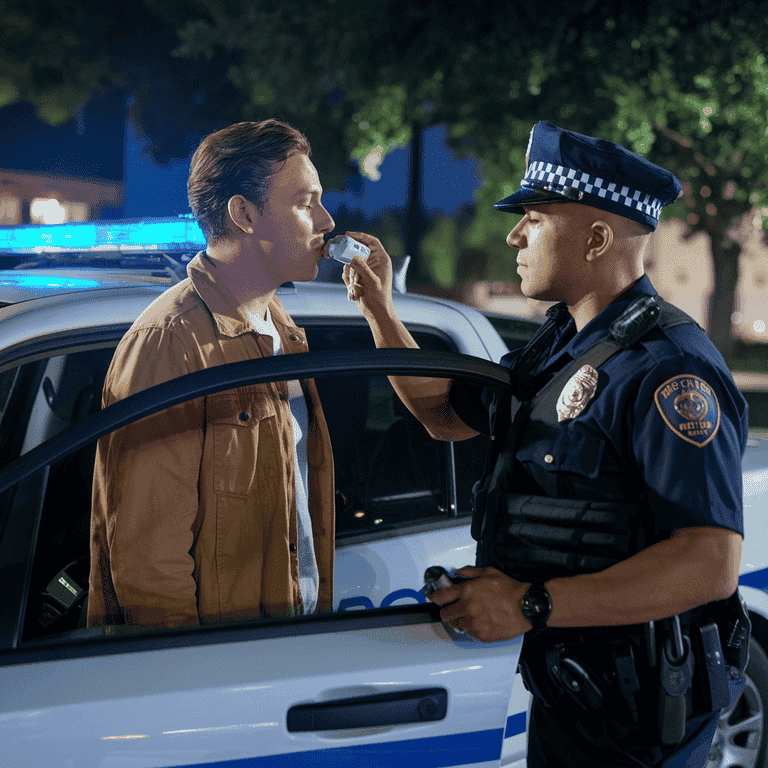With over 20,000 arrests made yearly in Las Vegas alone, police procedure errors happen more often than you might think. Just last year, a Clark County resident had his entire case dismissed when the court found police had searched without legal grounds. What seemed like a straightforward drug possession case crumbled because of a simple but critical mistake in police procedure. Understanding these errors could be the key to your defense if you’re facing criminal charges.

Overview of Police Procedure Errors
Police officers must follow strict rules when they stop, search, and arrest people. These rules protect your constitutional rights. Common mistakes include illegal searches without warrants, flawed traffic stops without reasonable suspicion, mishandled evidence, and improper interrogations. When police miss these steps, the evidence they collect might be thrown out of court. Throughout this guide, we’ll explore how these procedural mistakes can strengthen your defense in Nevada courts and what to do if you suspect errors in your case.
How Procedural Errors Can Form the Backbone of Your Defense in Nevada Cases
Illegal Stops and Searches Without Valid Grounds
The Fourth Amendment protects you from unreasonable searches and seizures. In Nevada, police must have reasonable suspicion to stop you and probable cause or a warrant to search your property. For example, an officer can’t pull you over just because you’re driving in a certain neighborhood at night – they need specific facts suggesting criminal activity.
When officers conduct searches without these legal grounds, any evidence they find can be ruled inadmissible. This happened in a recent Las Vegas case where drugs discovered during a routine traffic stop were thrown out because the officer couldn’t explain why he asked the driver to exit the vehicle and conducted a search. The entire case collapsed because this initial search lacked proper justification.
Warrant Filings and the Importance of Strict Adherence
Search warrants in Nevada must meet exacting standards. They must clearly describe the place to be searched and items to be seized, be supported by probable cause, and be executed appropriately. Officers must knock and announce their presence unless they have a “no-knock” warrant.
Evidence becomes vulnerable to suppression when warrants contain errors or officers don’t follow proper procedures. A recent Henderson case illustrated this when evidence was excluded after officers executed a search warrant at night that was only authorized for daytime service. This seemingly minor detail provided the foundation for a successful defense motion to suppress.

Evidence Handling & Chain of Custody Errors – Undermining the Prosecution’s Case
Common Evidence-Handling Mistakes
Physical evidence must be handled meticulously from the moment it’s collected until it appears in court. Common mistakes include:
– Improper collection methods that contaminate evidence
– Failing to wear gloves when handling drug evidence
– Incorrect packaging of biological samples
– Missing documentation on who handled evidence and when
– Storage in improper conditions that degrade samples
– Gaps in transfer documentation between departments
These errors are especially common with drug evidence, firearms, and biological samples in DUI cases. When evidence is mishandled, defense attorneys can challenge its reliability and authenticity.
How Chain of Custody Errors Impact Your Defense
The chain of custody is the documented history showing who had possession of evidence at all times. Each person who handles evidence must sign for it, creating an unbroken chain from the crime scene to the courtroom. Breaks in this chain raise questions about tampering or contamination.
In Nevada courts, chain of custody breaches can lead to evidence being deemed unreliable or excluded entirely. Your defense attorney should scrutinize evidence logs, looking for:
– Missing signatures
– Unexplained time gaps
– Inconsistencies in documentation
– Improper transfers
One recent Las Vegas drug case collapsed when defense counsel identified a 36-hour period where drug evidence was unaccounted for between collection and testing. The prosecution couldn’t prove the substance tested was the same one collected, creating reasonable doubt that led to acquittal.
Unlawful Interrogations and Miranda Violations – Protecting Your Rights
When Miranda Rights Are Not Respected
Miranda warnings are fundamental to protecting your Fifth Amendment rights against self-incrimination. Nevada officers will need to let you know of your rights to remain silent and have an attorney present during custodial interrogations. If they fail to do this, your statements may be deemed inadmissible.
Common Miranda violations include:
– Questioning before reading rights
– Continuing to question after you request an attorney
– Using coercive tactics to obtain statements
– Failing to ensure you understand your rights
A Henderson case demonstrates the impact: after a suspect requested an attorney, officers continued questioning about a robbery and obtained a confession. Because this violated Miranda protections, the confession was suppressed, dramatically weakening the prosecution’s case.
Impact on DWI/DUI Cases
Miranda violations are widespread in DUI cases. Officers often ask potentially incriminating questions during traffic stops without providing Miranda warnings, such as “How many drinks have you had tonight?”
In addition, statements about refusing blood tests can sometimes be excluded if proper warnings aren’t given. Nevada has implied consent laws for chemical testing, but officers must follow appropriate procedures when requesting and administering tests. If they fail to inform you properly about the consequences of refusal, your statements and possibly the refusal might be challenged in court.

Testing and Procedural Flaws in DWI/DUI Cases – Critical Defensive Leverage
Faulty Field Sobriety and Blood Tests
Field sobriety tests (FSTs) must be administered according to strict National Highway Traffic Safety Administration standards. Common errors include:
– Conducting tests on uneven surfaces
– Failing to account for physical limitations
– Improper demonstration of test requirements
– Incorrect scoring of performance
For chemical tests, breathalyzers must be appropriately calibrated and maintained, while blood samples must be drawn by qualified personnel using proper antiseptics. The testing equipment must meet state standards and have current certifications.
Many Nevada DUI cases have been dismissed when defense attorneys proved that breath testing machines weren’t properly calibrated or that blood samples weren’t stored at the correct temperature. Even issues like diet (such as keto diets producing false positives) can affect test results if officers don’t account for them.
Understanding the Standards for Warrantless Testing in Nevada
Nevada law allows warrantless blood draws in limited circumstances, such as when accidents involve fatalities or serious injuries. However, officers must still have probable cause to believe you were driving under the influence.
The U.S. Supreme Court has restricted warrantless blood draws in many circumstances, requiring officers to obtain warrants unless there are genuine exigent circumstances. Nevada courts have followed this precedent, throwing out evidence from improper warrantless tests.
If you’re involved in a DUI case where blood was drawn without consent or a warrant, examining whether true exigency existed can be a crucial defense strategy that might lead to suppression of key evidence.
Bias and Procedural Fairness – Recognizing Injustice and Strengthening Your Defense
Identifying Bias in Police Procedures
Biased policing undermines the integrity of the justice system and can form the basis for challenging arrests and evidence. Warning signs of bias include:
– Stops based primarily on race, ethnicity, or neighborhood
– Different treatment than other similarly situated suspects
– Disparaging comments in police reports or body camera footage
– Pattern of similar stops in particular communities
When bias influences police actions, it may violate equal protection guarantees and provide grounds for challenging the legitimacy of stops, searches, or arrests. Please document any signs of discriminatory treatment immediately, as they can significantly strengthen your defense.
Legal Precedents Supporting Defense Claims
Nevada courts have established essential precedents regarding police mistakes and bias. The Nevada Supreme Court has recognized that even reasonable police mistakes of law don’t always justify stops or searches, particularly when statutory interpretation is at issue.
Unlike some jurisdictions that follow the more lenient Heien precedent (which allows reasonable mistakes of law to justify stops), Nevada courts often require apparent statutory ambiguity before validating police mistakes. This stricter standard protects against overreach and offers your defense team additional arguments against unlawful police actions.
Legal Strategies and Best Practices for Challenging Procedural Errors in Nevada
How to Document and Challenge Procedural Errors
If you suspect police made procedural errors in your case:
1. Get copies of all police reports as soon as possible
2. Request body camera and dashboard camera footage before it’s deleted
3. Take photographs of the location where stops or searches occurred
4. Get contact information from any witnesses
5. Write down your recollection of events immediately
6. Note any unusual or concerning officer behaviors
7. Keep records of all communications with law enforcement
This documentation provides the raw material your defense attorney needs to identify procedural errors and build effective suppression motions. The more detailed your records, the stronger your potential defense.
The Role of Experienced Legal Counsel in Nevada Cases
Procedural errors don’t automatically lead to dismissed charges – you need skilled legal representation to identify errors and present them effectively to the court. An experienced Nevada criminal defense attorney will:
– Know which errors are most likely to persuade local judges
– Understand the specific requirements of Nevada law enforcement procedures
– Have relationships with expert witnesses who can testify about proper protocols
– Know how to file effective motions to suppress evidence
– Recognize patterns of procedural errors by specific departments or officers
With proper legal guidance, what seems like a minor mistake by the police might become the foundation of your defense strategy.

Breaking It All Down
Recap of Key Takeaways
Police procedure errors can dramatically change the outcome of your case. From illegal searches and improper stops to evidence mishandling and biased policing, these mistakes violate your constitutional rights and can lead to evidence suppression or case dismissal. Understanding these errors and working with knowledgeable legal counsel can transform procedural mistakes from technical violations into powerful defense tools.
Actionable Next Steps and Resources
If you believe police made procedural errors in your case:
1. Contact a criminal defense attorney immediately to preserve all potential defenses
2. Request all evidence, including police reports and recordings
3. Document everything you remember about your interactions with law enforcement
4. Don’t discuss your case with anyone except your attorney
5. Be prepared to challenge evidence through pretrial motions
Remember that procedural errors don’t automatically lead to favorable outcomes – they must be adequately identified and argued by skilled legal counsel. With vigilance and proper representation, you can ensure that any police mistakes work to strengthen your defense rather than being overlooked.

Frequently Asked Questions
What should I do if I think the police violated my rights during an arrest?
If you believe your rights were violated, immediately write down everything you remember about the incident. Preserve any evidence, like videos or witness contact information, and immediately speak with a criminal defense attorney. These details can be critical in building your case.
Can police mistakes get my case dismissed?
Yes, in many cases. If law enforcement violated your constitutional rights or failed to follow proper procedures, the evidence they collected could be thrown out. Prosecutors may be forced to dismiss or reduce the charges without key evidence.
How long do I have to challenge a police procedure error in Nevada?
The sooner you act, the better. Some evidence, like body camera footage, may be deleted within weeks if not requested. Your attorney needs time to file pretrial motions and prepare arguments, so contact legal counsel immediately.
Are procedural errors more common in misdemeanor or felony cases?
Procedural errors can occur in both types of cases. However, they’re often more aggressively challenged in felony cases with higher stakes. Even in misdemeanor cases, these errors can lead to dismissals or plea deal leverage.
What types of cases are most impacted by procedural errors?
Drug offenses, DUI charges, and search-related crimes are particularly vulnerable to police errors. These cases often rely heavily on physical evidence; if that evidence is obtained improperly, it can be excluded from trial.
Can I challenge evidence even if I already gave a confession?
Yes. If your confession was obtained through coercion or without proper Miranda warnings, your attorney can argue to suppress it. Evidence collected through flawed procedures might still be thrown out even if the confession stands.
Is it possible to sue the police for procedural violations?
In some cases, yes—especially if the violation caused significant harm, such as unlawful imprisonment or physical injury. However, civil lawsuits are separate from your criminal defense and have different legal standards. Talk to your attorney about your options.
Will the court automatically find out about police mistakes?
Not usually. It’s up to your defense attorney to identify, investigate, and raise the issue in court. That’s why hiring an experienced criminal defense lawyer is so important—they know what to look for and how to use it strategically.
Do all defense attorneys in Nevada know how to challenge police procedures?
While many attorneys understand the basics, the most effective ones have deep experience in procedural challenges. Look for a defense lawyer who has successfully filed motions to suppress and win dismissals based on police errors.
Can procedural errors help reduce my sentence if I'm convicted?
Sometimes. If procedural flaws are discovered after a conviction, they can be grounds for appeal or post-conviction relief. Additionally, if raised during sentencing, they might influence a judge to impose a lighter penalty.
Additional Resources
If you found this article helpful, you may also be interested in exploring other criminal defense topics we cover. Learn more about how our team can protect your rights in a wide range of cases:
Criminal Defense Attorney – Explore our full-service criminal defense representation in Las Vegas.
Las Vegas DUI Lawyer – Charged with a DUI? Learn how we fight breathalyzer errors, improper stops, and more.
Domestic Violence Lawyer Las Vegas – Discover your legal options when facing domestic violence charges.
Drug Possession Lawyer – From search issues to testing problems, we tackle every angle of drug defense.
Sex Crimes Attorney – Defend your reputation and freedom with aggressive sex crime defense.
CPS Defense Attorney – Accused of child abuse or neglect? We know how to fight back against CPS.
Misdemeanor Lawyer – Don’t let a misdemeanor conviction impact your future—get the defense you need.
Las Vegas Warrant Defense Attorney – Have an active warrant? Find out how we can help resolve it discreetly.
Las Vegas Probation Violation Attorney – Learn what to do if you’re facing a probation violation.
Theft Crime Defense Lawyer – Charged with theft? Let us protect your record and your freedom.
Kidnapping Lawyers – High-stakes defense for kidnapping allegations in Nevada.
Juvenile Defense Lawyers – Protecting minors facing charges in the Nevada juvenile justice system.
Firearms Lawyer Las Vegas – Facing a gun charge? Our team knows Nevada’s firearm laws inside and out.
Have questions or need immediate help? Call us at (702) 433-2889 to schedule your free consultation today.

Offsite Resources for You
Here are seven offsite resources that complement the content about police procedure errors and criminal defense in Nevada. These sites provide valuable legal insights, case law updates, civil rights information, and tools for those facing criminal charges:
American Civil Liberties Union (ACLU) – Offers extensive resources on constitutional rights, police accountability, and criminal justice reform.
National Association of Criminal Defense Lawyers (NACDL) – Provides advocacy, legal updates, and defense resources for attorneys and individuals involved in the criminal justice system.
FindLaw – Features comprehensive articles on criminal law, including police procedure, Miranda rights, and evidence handling.
Flex Your Rights – An educational nonprofit focused on teaching individuals how to assert and protect their constitutional rights during police encounters.
Innocence Project – Highlights wrongful convictions and how forensic errors, procedural misconduct, and faulty evidence handling contribute to them.
National Police Accountability Project (NPAP) – Dedicated to holding law enforcement accountable and educating the public about their rights and legal remedies.
Justia – Offers free legal information on criminal defense, DUI law, evidence procedures, and civil rights violations.
These trusted resources can help deepen your understanding of legal procedures, empower your defense, and ensure your rights are protected throughout your case.

A Special Message from Our Lead Attorney, Molly Rosenblum Allen, Esq

If you believe errors in police procedure played a role in your arrest or charges, don’t wait—your defense starts now. The sooner you act, the stronger your position. Call us at (702) 433-2889 to schedule your free, confidential consultation. Our experienced Nevada criminal defense team is ready to evaluate your case, protect your rights, and fight for the best possible outcome.




